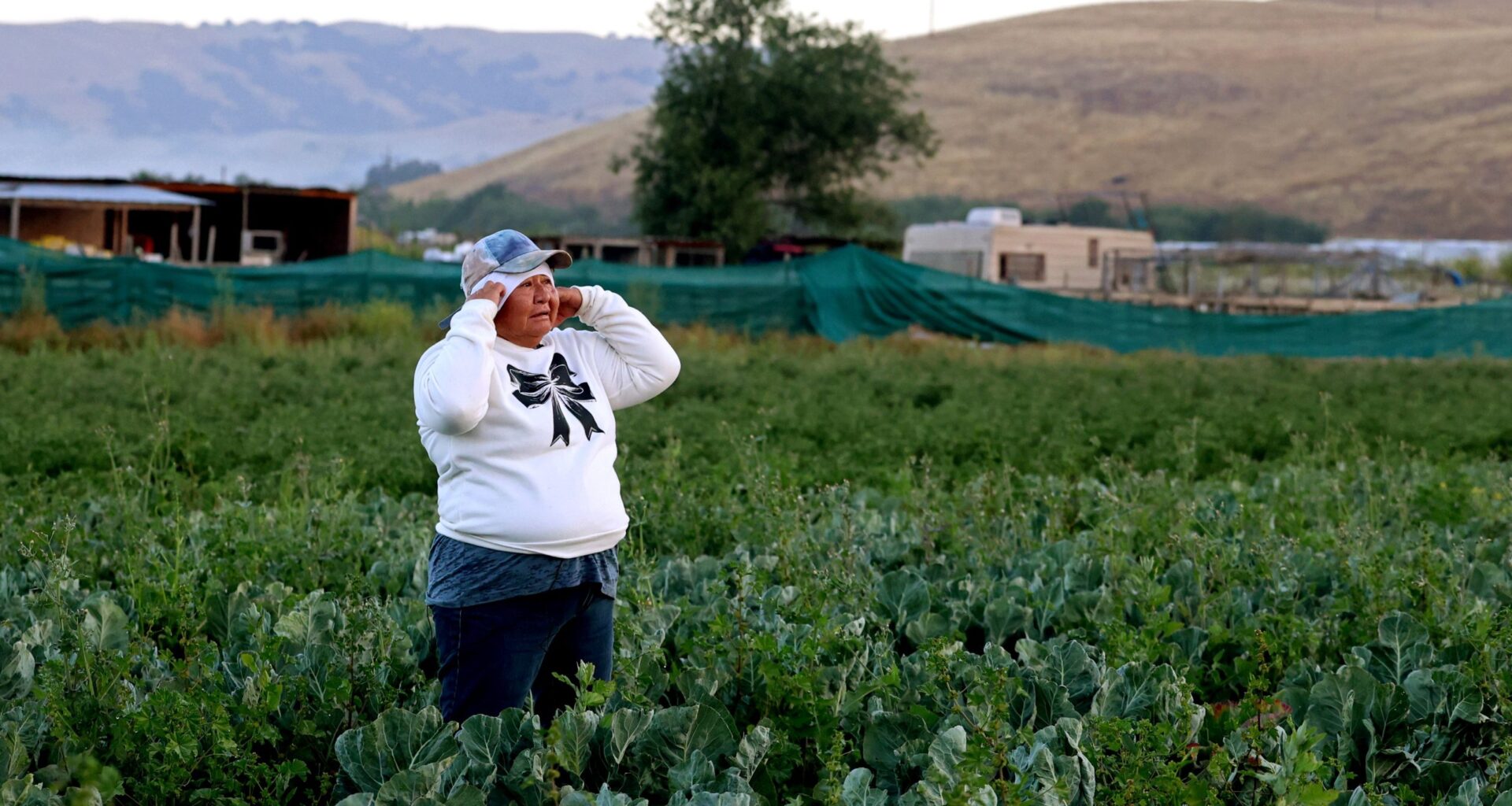Taber’s 900-cow dairy requires constant attention and long hours — but it’s home.
“It’s the best place in the world to raise a family,” he said. “It’s a lot of late nights. There’s a lot of times that I’m (working) 24-hour days.”
Yet more and more, Taber has been pulled away from this work and into policy, traveling to Washington, D.C., to advocate for immigration reform that has been stalled for years.
(Video by Carlos Rene Castro and Gracyn Thatcher/News21)
“What I cannot stand is the fact that Congress cannot get anything across the finish line,” he said. “Maybe we can’t solve it all in one big, beautiful bill. Who knows? Maybe we can.”
The Trump administration’s crackdown on immigration has left farmers worried about their livelihoods and workers frightened for their lives. It’s also renewed bipartisan calls to implement reforms for the people who help feed America.
“Yeah, get the criminals out,” Taber said. “But your farmworkers are not your criminals.”
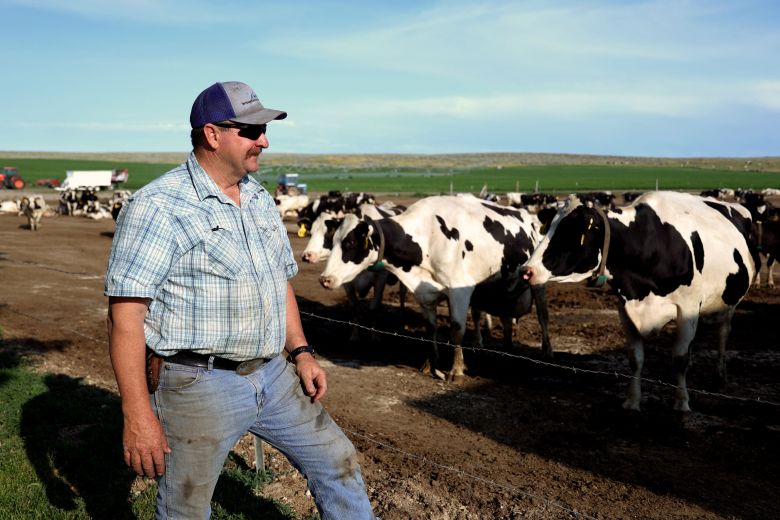 Darren Taber, owner and manager of Donley Farms, looks out at some of his farm’s dairy cows on June 24, 2025, in Shoshone, Idaho. Despite requiring year-round work, Idaho’s dairy industry doesn’t have access to a visa program. (Photo by Ryan Luetkemeyer/News21)
Darren Taber, owner and manager of Donley Farms, looks out at some of his farm’s dairy cows on June 24, 2025, in Shoshone, Idaho. Despite requiring year-round work, Idaho’s dairy industry doesn’t have access to a visa program. (Photo by Ryan Luetkemeyer/News21)
President Donald Trump has indicated he might be amenable to a solution.
In June — after reports of arrests at a New Mexico dairy, at a Nebraska meat production plant and in the fields of California — the administration ordered a pause on workplace raids in agriculture and hospitality, but it reversed course days later.
Trump then said in a July 3 speech that he was working to help farmers who depend on migrant labor — indicating his administration was making progress on legislation to address the issue.
Trump and other leaders have discussed a work program that would ensure farmers have the labor they need but would not provide amnesty for farmworkers who lack legal status.
Many farmers insist they do what is required of any employer when hiring workers, but say there is a growing expectation that employers police workers’ legal status.
“We are not ICE agents,” said Andrew Mickelsen, co-owner of Mickelsen Farms, a large potato farm in Idaho. “Last time I checked, I haven’t been deputized. I haven’t been issued a bulletproof vest or a gun, and I haven’t gotten a paycheck yet to be an ICE agent.”
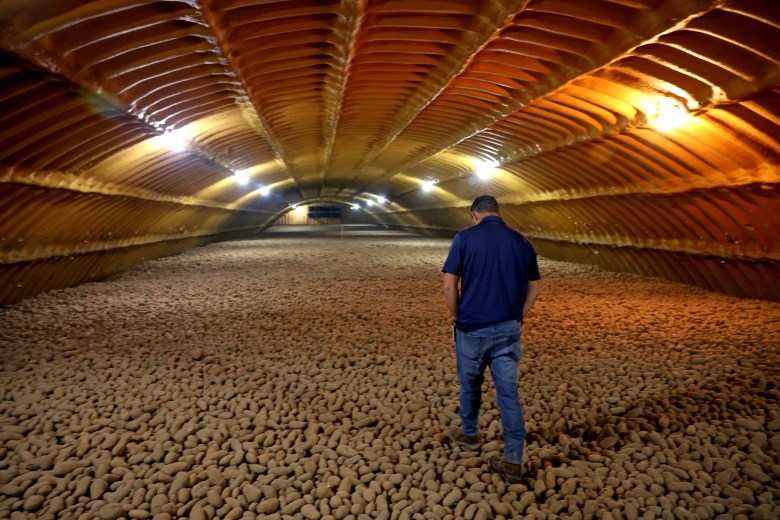 Andrew Mickelsen, a partner in Mickelsen Farms, walks through one of the farm’s many potato warehouses on Tuesday, June 24, 2025, in Roberts, Idaho. Mickelsen says the farm couldn’t complete harvest without H-2A immigrant workers. (Photo by Ryan Luetkemeyer/News21)
Andrew Mickelsen, a partner in Mickelsen Farms, walks through one of the farm’s many potato warehouses on Tuesday, June 24, 2025, in Roberts, Idaho. Mickelsen says the farm couldn’t complete harvest without H-2A immigrant workers. (Photo by Ryan Luetkemeyer/News21)
Nearly 70% of people working in agriculture were not born in the United States, according to federal data, and about 42% of that workforce lacks legal status. Yet protections for workers without legal status are limited.
The H-2A visa is a temporary permit that allows farmers to hire foreign farmworkers if there aren’t enough domestic workers to fill labor needs — a growing reality for employers. In 2014, the U.S. issued around 90,000 H-2A visas. Last year, that number rose to 315,000.
Yet industries that require year-round labor, such as Idaho dairy, cannot legally hire workers using the temporary visa.
“You can guess how dependent we are on an unauthorized workforce,” said Rick Naerebout, CEO of the Idaho Dairy Association, who wants to see legal status for existing workers and access to a visa program that can meet labor demands.
“We can’t feed ourselves as a country if we don’t find a solution to this problem,” he said.
For years, federal lawmakers have introduced legislation that would grant legal status to long-term workers, but it has never gotten past the Senate.
The latest version of the bill would allow a qualified individual with extended employment in farmwork to become a “certified agricultural worker” on the condition of continued employment.
The bill also would provide at least 20,000 H-2A visas each year for the next decade for farmers with year-round labor needs. Half of those visas would be reserved for the dairy industry.
Zach Rutledge, an agricultural economics expert at Michigan State University, said the bill’s pathway to legal status may be what’s holding it back.
“It’s hard to get bipartisan support when you’re talking about legalizing hundreds of thousands of unauthorized workers — especially in our current political climate,” Rutledge said.
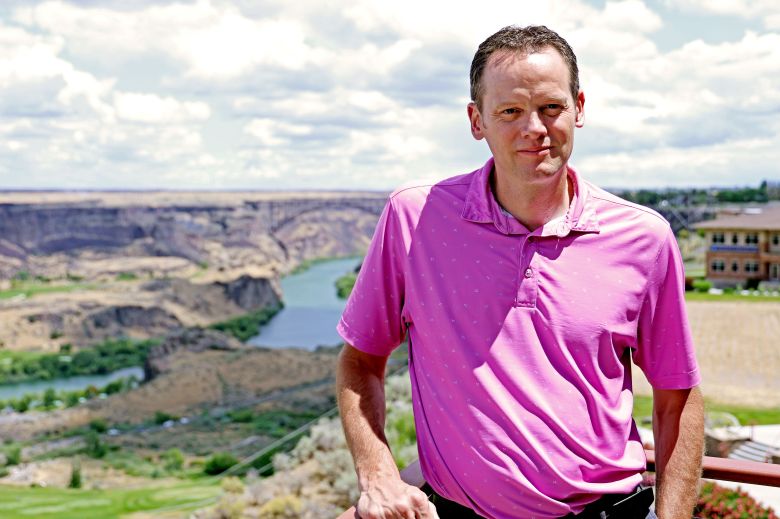 Rick Naerebout, CEO of the Idaho Dairymen’s Association, stands on the balcony of his office overlooking the Snake River Canyon on June 22, 2025, in Twin Falls, Idaho. Naerebout has advocated for immigration reform for two decades to no avail. (Photo by Ryan Luetkemeyer/News21)
Rick Naerebout, CEO of the Idaho Dairymen’s Association, stands on the balcony of his office overlooking the Snake River Canyon on June 22, 2025, in Twin Falls, Idaho. Naerebout has advocated for immigration reform for two decades to no avail. (Photo by Ryan Luetkemeyer/News21)
Given that immigrants play an important role across many sectors of the country’s economy, tension between business interests and those who support mass deportations is growing.
“We understand the need for enforcement,” Naerebout said. “But we also have to have a conversation around immigration reform so that we don’t damage our economy.”
California has the largest number of immigrants lacking legal status in the U.S., according to the Pew Research Center, and is home to about half of the unauthorized agricultural worker population, statistics show.
Since January, immigration agents have arrested hundreds of people in the state — increasing fear among those who work the fields and concern from those who employ them.
As the sun rises over the golden hills of California’s Salinas Valley, the region’s 25,000 farmworkers are already hunched at the waist, planting and harvesting America’s produce.
M.M., a farmworker from Puebla, Mexico, has been in the United States for over a decade. She works long days harvesting cauliflower, tomatoes and strawberries.
She requested anonymity because she is in the U.S. without legal status and the fear looms that Immigration and Customs Enforcement officers could appear at any time. She only leaves the house to go to work.
“I’m still afraid with the uncertainty of being deported,” she said. “But, oh well. We have to keep working and move forward.”
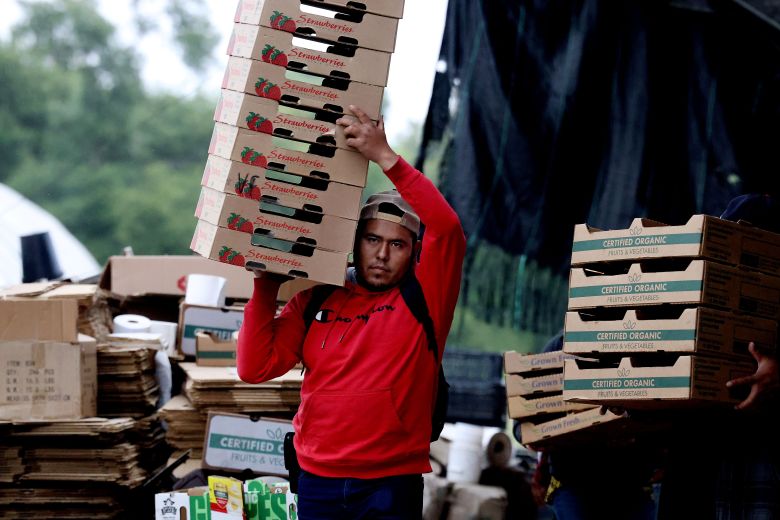
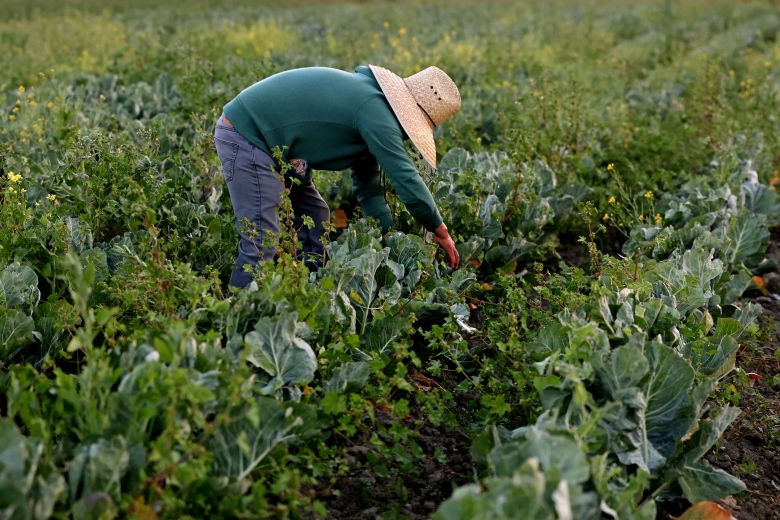
Left: Sergio Munguia, an H-2A visa holder, carries boxes to package strawberries at an organic farm on June 16, 2025, in Royal Oaks, Calif. Right: A farmworker harvests cauliflower on June 14, 2025, in San Benito County. (Photos by Meghan O’Brien/News21)
Farmworker S.H. works on a small, organic farm nestled in the fertile soil of San Benito County — part of the “Salad Bowl of the World.” His efforts contribute to the Golden State’s $58 billion agriculture industry and yet, he said: “You don’t feel safe anywhere.”
Javier Zamora is a midsize organic farmer in the Salinas Valley who immigrated to the U.S. more than four decades ago. He grows blueberries, strawberries, tomatoes and other produce on about 100 acres of land.
Zamora wonders why the Trump administration would want to deport the people who help stock grocery shelves.
“America would not be as great as it is now if all my workforce were taken away,” he said.
Lawmakers, he said, “need to wake up and they need to do something. And it needs to be done quickly — before it’s too late.”
News21 reporter Carlos Rene Castro contributed to this story. This report is part of “Upheaval Across America,” an examination of immigration enforcement under the second Trump administration produced by Carnegie-Knight News21. For more stories, visit https://upheaval.news21.com/.
Related

Want more? Sign up to get Stocktonia delivered to your inbox three days a week.
